World Matchplay 2023
Thirty Years World Matchplay - Part 3 - The Players from Great Britain
When you have a look at the winnerslist of the World Matchplay the name Phil Taylor immediately catches the eye as it appears so often. Sixteen times Taylor won the event, as often as the World Championship. It is not likely that there will be another player in future who will be so longlasting and dominant at the same time.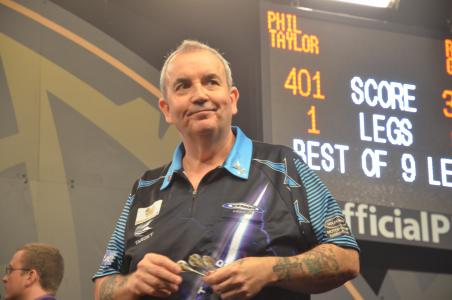 Taylor was in the first year of the World Matchplay an unseeded player and lost in the second round to Bob Anderson. In both his matches he averaged under 100.
He won the second World Matchplay - against Dennis Priestley with an 90.72 average in the final and had one average of 100.38 during the event. The following year it was Peter Evison who won the event. He eliminated Taylor in the second round. Evison played a good final and Priestley once again was left with nothing.
Taylor was in the first year of the World Matchplay an unseeded player and lost in the second round to Bob Anderson. In both his matches he averaged under 100.
He won the second World Matchplay - against Dennis Priestley with an 90.72 average in the final and had one average of 100.38 during the event. The following year it was Peter Evison who won the event. He eliminated Taylor in the second round. Evison played a good final and Priestley once again was left with nothing.
1997 Taylor had improved. Already in his first match he had an average of 113.43 and in the final - which he won against Alan Warriner he played an average of 106.36. Nevertheless he couldn't defend his title in the following year - 1998 Rod Harrington won the tournament against Ronnie Baxter who defeated Taylor in the semi-finals. The final was not a bad one which both players averaging close to 100.
Harrington managed to defend the title in 1999 - he met Peter Manley in the final who had defeated Taylor in the semis. It was far from an highlevel final but in some way reflected the level of most players of the time - both players had an average of just below 90.
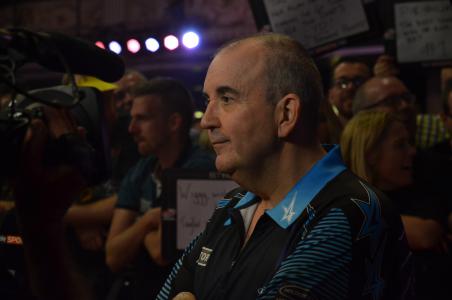 In the following year we had a repeat of the 1997 final - Taylor again met Alan Wartriner. Taylor played an 100.32 average and had before already won matches with an 101 nd an 102 average. In this year there were the first 170 Finishes as well - one from Alex Roy and one from American Steve Brown. 2002 Taylor improved even further - beside the final he played in three matches averages of over 100. Richie Burnett was a serious opponent in the final as he averaged 97.14 to Taylor's 100.32. All in all won could say that Taylor was clearly better then all other participants - he was the only one who managed to play consistently averages of around 100. The same happened in 2002 again when he defeated John Part in the final - Taylor impressed with averages of 100.86, 104.01, 112,17, 95.91 and 98.76.
In the following year we had a repeat of the 1997 final - Taylor again met Alan Wartriner. Taylor played an 100.32 average and had before already won matches with an 101 nd an 102 average. In this year there were the first 170 Finishes as well - one from Alex Roy and one from American Steve Brown. 2002 Taylor improved even further - beside the final he played in three matches averages of over 100. Richie Burnett was a serious opponent in the final as he averaged 97.14 to Taylor's 100.32. All in all won could say that Taylor was clearly better then all other participants - he was the only one who managed to play consistently averages of around 100. The same happened in 2002 again when he defeated John Part in the final - Taylor impressed with averages of 100.86, 104.01, 112,17, 95.91 and 98.76.
In this year the first nine-darter in the history of the event was thrown - of course by Phil Taylor while Keith Deller delighted the fans with an 170 finish. The next two years Taylor won again - once against Wayne Mardle and once against Mark Dudbridge.
2005 Taylor lost in the quarterfinals to John Part who reached the final only to lose to Colin Lloyd. Lloyd was in this year the strongest player. His average in the final was 102.57 and in one of his matches he threw a 170 Finish as well. 2006 Taylor was back and won his next final - this time against James Wade. Taylor again averaged over 100 while Wade was way back on 90.28. Beside Taylor Andy Hamilton played an over 100 average but Hamilton was only a few years playing on that level.
Once again Taylor couldn't defend his title but lost 2007 to Terry Jenkins in the semi-finals. Jenkins met James Wade in the final and this time Wade prevailed.
The number of players who were able to throw averages over 100 slowly increased. 2007 it where beside Taylor Wade, Adrian Lewis and Raymond van Barneveld.
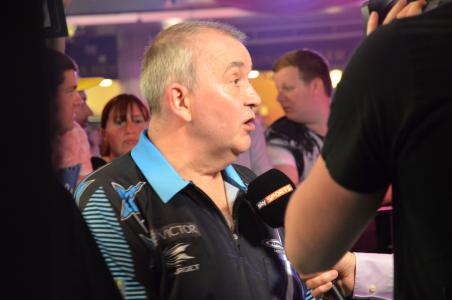 2008 Wade for the third time reached the final but couldn't defend his title against Phil Taylor who had averages of 103.35, 109.70, 96.78, 105.59 and 109.46. Wade played averages of over 100 in the semi-finals and the final. The only other over 100 average that year came from Mark Walsh in his first round match.
2008 Wade for the third time reached the final but couldn't defend his title against Phil Taylor who had averages of 103.35, 109.70, 96.78, 105.59 and 109.46. Wade played averages of over 100 in the semi-finals and the final. The only other over 100 average that year came from Mark Walsh in his first round match.
Similar strong was Taylor in 2009 again. He defended his title against Terry Jenkins and only had a single average below 100 with 97.19 in his first round match. Two players beside Taylor had one match with an over 100 average - Mervyn King in the quarterfinals and Kevin Painter in first round.
2010 Taylor had improved even more. He defended his title in the final against Raymond van Barneveld - it was a highclass final in which both playes had averages of over 100. Taylor's average was 105.16 to van Barnevelds 100.11. On his way into the final Taylor played no average below 100. He played 114.99, 104.60, 103.31, and 103.46 - a perfomance which would be hard to exceed even now-a-days. Raymond van Barneveld threw the second World Matchplay nine-darter. 2011 Taylor managed to play on a similar high level - no average below 100 in all of his matches. He defended his title in a final against James Wade again. And we had a third nine-darter - this time from John Part.
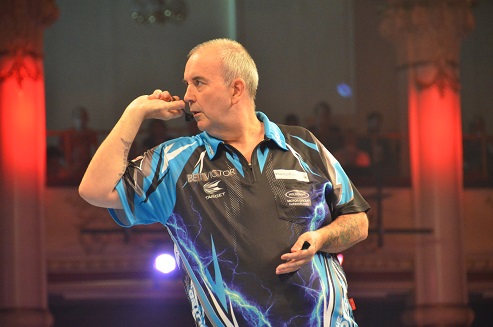 2012 another Taylor v Wade final followed with the same results though Taylor was not on the same level. It was the first year that Michael van Gerwen won two of his matches with averages of over 100. While Taylor shone with two 170 Finishs Michael van Gerwen impressed with a nine-darter. Taylor was not the only one with an 170 Finish - both Dave Chisnall and Joe Cullen threw one as well. And beside Michael van Gerwen Wes Newton produced a nine-.darter.
2012 another Taylor v Wade final followed with the same results though Taylor was not on the same level. It was the first year that Michael van Gerwen won two of his matches with averages of over 100. While Taylor shone with two 170 Finishs Michael van Gerwen impressed with a nine-darter. Taylor was not the only one with an 170 Finish - both Dave Chisnall and Joe Cullen threw one as well. And beside Michael van Gerwen Wes Newton produced a nine-.darter.
In the following year Taylor defended his title against Adrian Lewis and with Lewis and Van Gerwen two more players now were in the mix who were capable to produce not only an occasional over 100 average but hit those averages consitently. Taylor needed in the final an 111.23 average to prevail.
In 2014 Michael van Gerwen reached the World Matchplay final for the first time, but Taylor was still able to deny him the win. Beside Taylor and van Gerwen we now had Michael Smith and Gary Anderson in the tournament as well who were cappable to pull over 100 averages out of the hat regularily. Taylor threw his second World Matchplay nine-darter that year but one could already sense that Taylor's dominance began to unravel.
2015 Taylor lost in the semi-finals to James Wade who was defeated in the final by Michael van Gerwen. One year later Taylor and van Gerwen met for a second time in the final. Both had played a good tournament and for both a 98.72 average had been so far the lowest. Michael van Gerwen managed to defend the title and many proclaimed the end of an era.
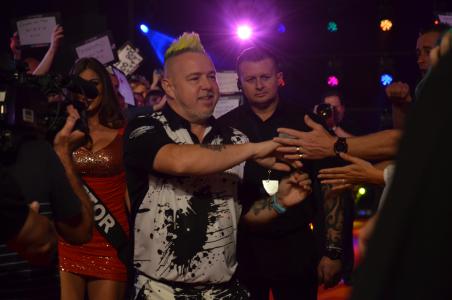
But Taylor had other plans though he started to talk about his age, the strains of all the travelling and of the long tournaments and about retirement. He didn't intend to end his career with defeat and was back in Blackpool in 2017. In the quarterfinals he eliminated Michael van Gerwen. In the semifianls he defeated Adrian Lewis and in the final he was just too much for Scotsman Peter Wright, the first Scotsman who ever reached the final of the tournament. And to be sure- Taylor had the last laugh once again and won his 16. World Matchplay title.
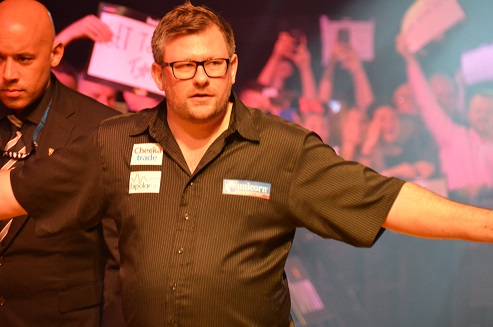 Beside Taylor James Wade was till 2015 the most successfull English player in the tournament. Though he only won it once he reached five more finals which he all lost. After 2015 he never lived up to his earlier success.
Beside Taylor James Wade was till 2015 the most successfull English player in the tournament. Though he only won it once he reached five more finals which he all lost. After 2015 he never lived up to his earlier success.
Other winners from England were Rod Harrington in 1998 and 1999, Colin Lloyd in 2005 and Rob Cross in 2019. Cross took part in every World Matchplay since 2017 but the win 2017 was so far his only success. In all other years he was at the latest after the second round out of the competition. Colin Lloyd's World Matchplay experience was quite similar. Lloyd took part in the event for the first time in 2001. Beside his win he only once reached the semi-finals in 2002 though he took part in the tournament till 2011. Rod Harrington on the other side was already among the participants of the first World Matchplay were he reached the semi-finals. Two years later he stood in the quarterfinals before he left Blackpool two years in row as the champion. 2000 he once again reached the quarterfinal before he twice lost in the first round. This were his last World Matchplay appearances.
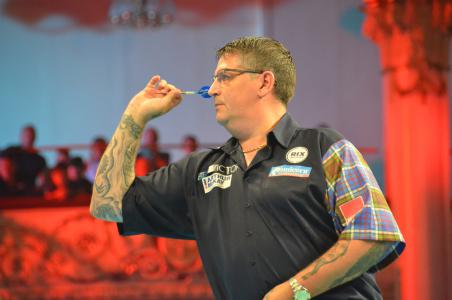 2018 - in the first year after Taylor - Gary Anderson was the first Scotsman to win the title. With the exception of the years 2006, 2007 and 2009 in each World Matchplay at least one Scotsman was among the participants. In the first year 1994 with Jamie Harvey and Jocky Wilson two Scotsman stood at the oche who both reached the quarterfinals. Wilson and Harvey returned the following year. After that it was only Harvey for many years - the last time he took part 2005 in the tournament. Only once in those years another Scotsman joined him - 1997 Drew O'Neill qualified as well. Havey lost most of the times in the first or second round but in 2004 he stood in the quarterfinals.
2018 - in the first year after Taylor - Gary Anderson was the first Scotsman to win the title. With the exception of the years 2006, 2007 and 2009 in each World Matchplay at least one Scotsman was among the participants. In the first year 1994 with Jamie Harvey and Jocky Wilson two Scotsman stood at the oche who both reached the quarterfinals. Wilson and Harvey returned the following year. After that it was only Harvey for many years - the last time he took part 2005 in the tournament. Only once in those years another Scotsman joined him - 1997 Drew O'Neill qualified as well. Havey lost most of the times in the first or second round but in 2004 he stood in the quarterfinals.
Since 2009 Gary Anderson and Peter Wright represent Scotland. They were joined over the years by Robert Thornton and later by John Henderson. Both Anderson (2018) and Wright (2021) won the tournament once. Anderson beside reached the semi-finals in 2014 and 2016 and the final in 2020. Wright reached beside the final 2017 - where he lost to Taylor - and the semi-finals in 2015 and 2018.
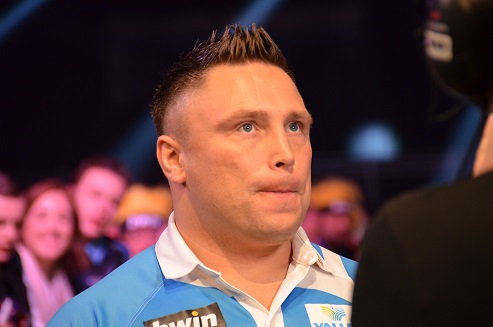 So far we didn't see a Welsh winner in the World Matchplay though till the first event almost every year one or more Welshman were among the participants.
Most successfull so far were Richie Burnett and Gerwyn Price who both once reached the final. Burnett was 1997 the first Welshman to qualify for the
tournament together with Anthony Ridler and in his first year reached the semi-finals. 2000 he reached his second semi-final and lost to Phil Taylor.
2001 he reached the final and again lost to Taylor. 2004 he took part again and was eliminated first round. 2005 it was Kelvin Painter who qualified for
Wales but he lost first round. On Painter followed Barried Bates who couldn't win a match either. 2010 Mark Webster qualified for the first time who reached
the quarterfinals one year later. 2012 and 2014 Richie Burnett returned. 2015 beside the returning Webster Gerwyn Price qualified for the first time and
reached the quarterfinals. Till than Price is regularily in Blackpool and he was joined in 2018 by Jonny Clayton. While Price lost 2020 in the final
to Michael van Gerwen Clayton so far was not successfull.
So far we didn't see a Welsh winner in the World Matchplay though till the first event almost every year one or more Welshman were among the participants.
Most successfull so far were Richie Burnett and Gerwyn Price who both once reached the final. Burnett was 1997 the first Welshman to qualify for the
tournament together with Anthony Ridler and in his first year reached the semi-finals. 2000 he reached his second semi-final and lost to Phil Taylor.
2001 he reached the final and again lost to Taylor. 2004 he took part again and was eliminated first round. 2005 it was Kelvin Painter who qualified for
Wales but he lost first round. On Painter followed Barried Bates who couldn't win a match either. 2010 Mark Webster qualified for the first time who reached
the quarterfinals one year later. 2012 and 2014 Richie Burnett returned. 2015 beside the returning Webster Gerwyn Price qualified for the first time and
reached the quarterfinals. Till than Price is regularily in Blackpool and he was joined in 2018 by Jonny Clayton. While Price lost 2020 in the final
to Michael van Gerwen Clayton so far was not successfull.
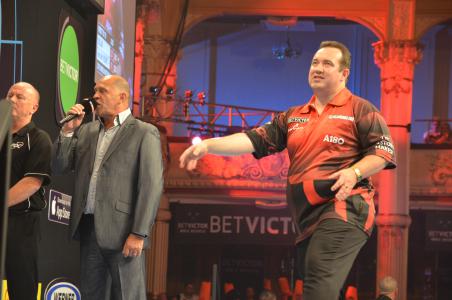 Already in the first World Matchplay 1994 we had with Tom Kirby a participant from the Republic of Ireland. He stayed till 1996. The so far only other player from the Republic of Ireland was Steve Lennon who only qualified once in 2018. There have been only two players from Northern Ireland in the tournament till 2022 as well - Brendan Dolan and Daryl Gurney. Dolan qualified for every year from 2012 - 2016 but never got further than the second round. He returned in 2020 - with similar results. Gurney qualified 2019 for the first time and returned every year. 2016 and 2023 he reached the quarterfinals. 2023 with Josh Rock an upcoming player from Northern Ireland qualified as well - but he lost already first round.
Already in the first World Matchplay 1994 we had with Tom Kirby a participant from the Republic of Ireland. He stayed till 1996. The so far only other player from the Republic of Ireland was Steve Lennon who only qualified once in 2018. There have been only two players from Northern Ireland in the tournament till 2022 as well - Brendan Dolan and Daryl Gurney. Dolan qualified for every year from 2012 - 2016 but never got further than the second round. He returned in 2020 - with similar results. Gurney qualified 2019 for the first time and returned every year. 2016 and 2023 he reached the quarterfinals. 2023 with Josh Rock an upcoming player from Northern Ireland qualified as well - but he lost already first round.
Who will win the World Matchplay 2023 one still can't perdict - this year's tournament was full of upsets and surprises. But one can already say that it will be a player from Great Britain as only three Englishman and one Welsh player reached the semi-finals.